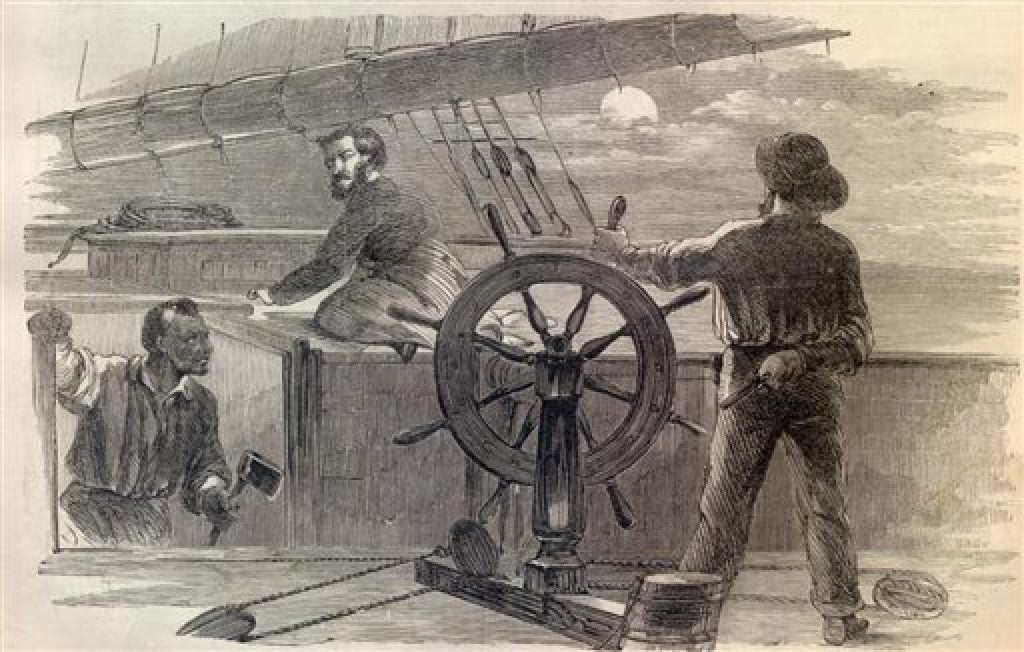William Tillman was the first black hero of the American Civil War. He was not a soldier but rather a 27-year-old cook-steward on the schooner S.J. Waring. Here is his story.
by Rear Admiral Daniel W. McKinnon (US Navy, Retired) Officers of a certain age remember the day when food service aboard a ship was performed by commissarymen in the enlisted mess and by stewards in the officer’s wardroom, the skipper’s cabin mess, and in the admiral’s flag mess.
The steward rating was segregated and most serving in the 18th and early 19th centuries were Chinese, Guamanians, Filipinos, or African Americans. Just like all Sailors, work was performed with pride and professionalism. For decades, Filipinos could join the Navy, serve as stewards, and carve a path toward American citizenship. Many Filipino-Americans can trace their heritage to that history. Competition for these positions was intense and successful candidates were destined to excel.
The best story of the early messman branch and the steward branch is found in Richard Miller’s 2004 book, “The Messman Chronicles.” I knew Richard and joined with him and the former head of Admiral Zumwalt’s CNO mess Master Chief Melvin Williams Sr. to obtain funds for a memorial marker at the site of the early 1930s messman school onboard the Naval Station in Norfolk.
Change came in the Zumwalt era. In January 1975, the two rates became one, and the mess management specialist was born. Today, the Navy’s food service professionals carry the proud name of culinary specialist, and they are, indeed, proud. They’re also good at what they do. Throughout history, on the mess decks, it was axiomatic that “a cook better know how to cook or better know how to swim.”
My first observance of steward segregation was when I reported aboard an Essex-class aircraft carrier in 1957. There were two berthing compartments on the ship under officer’s country, complete with private toilets and showers. One was on the port side and the other on the starboard side. One was for Filipinos and one was for African Americans. Those who designed this behemoth of a war ship did so with segregation in mind.
Did you know the first African-American hero of the Civil War was both cook and steward? Now that is a sea story.
His name was William Tillman, and his story has only been recently told. I discovered him by accident when buying at auction what may be his only known photograph. He is known as the “Union’s First Black Hero.”
“Billy” Tillman lived in Delaware and was born as a free African-American and had never been a slave. A seaman at 17-years-old, he became a cook and a steward on packet ships sailing the East Coast.
The Civil War began in April 1861. Tillman was serving as cook aboard the American schooner S.J. Waring. It was en route to a Confederate port when the ship was captured at sea off the U.S. East Coast on July 7, 1861 by a five man prize crew from the Confederate privateer Jefferson Davis.
Tillman had every reason to fear for his future in Southern hands. At first Tillman was treated well, but it did not take long for him to discover a plan for him to be sold into slavery. He would have none of it. Tillman used a hatchet to kill three of the five confederates, threw their bodies into the sea, and recaptured the vessel.
Tillman sailed the S.J. Waring successfully back north, arriving first to Sandy Hook, New Jersey and then New York. First placed in custody as a witness, Tillman soon became an instant celebrity and, to many, a hero. The famous showman P.T. Barnum invited Tillman to “Barnum’s American Museum” where for several days he would relate his experiences as Barnum displayed “the identical hatchet” used to bring down Confederate rebels.
It is known that Tillman took part in a successful and long lawsuit with the S.J. Waring’s owners for indemnification for recapturing their ship. It was reported that he received $7,000 as a result of the lawsuit; however, there is no record if he ever received the money and no record of his life after 1862. Nevertheless, his valor and resistance to slavery was undeniable.
Booker T. Washington called him “brave as a lion,” and Horace Greeley wrote in the New York Daily Tribune that the “nation was indebted to this black steward for the first vindication of its [the Union] honor on the sea.” Many were saying that William Tillman was “responsible for producing the Union’s first naval victory of the war.”
The Naval History and Heritage Command online indicates that Tillman was reportedly given a $6,000 award for his actions.
The story of this remarkable adventure can be found in the August 2018 issue of “Civil War Times,” and in an earlier 2016 book titled “The Rest I Will Kill.” The book title comes from a statement Tillman gave saying, “all that I can back alive, and the rest I will kill.”
By the way, the S.J. Waring had only one passenger, an Irishman who heroically helped Tillman. His last name was MacKinnon.
This article originally appeared in Navy Supply Corps Newsletter and was written by Rear Admiral Daniel W. McKinnon, Jr. who retired in 1991 as Commander, Naval Supply Systems Command and 36th Chief of Supply Corps. His command and his officers were responsible for the professionalism of food service operations in the U.S. Navy.
Tags:

 Join The Club
Join The Club











